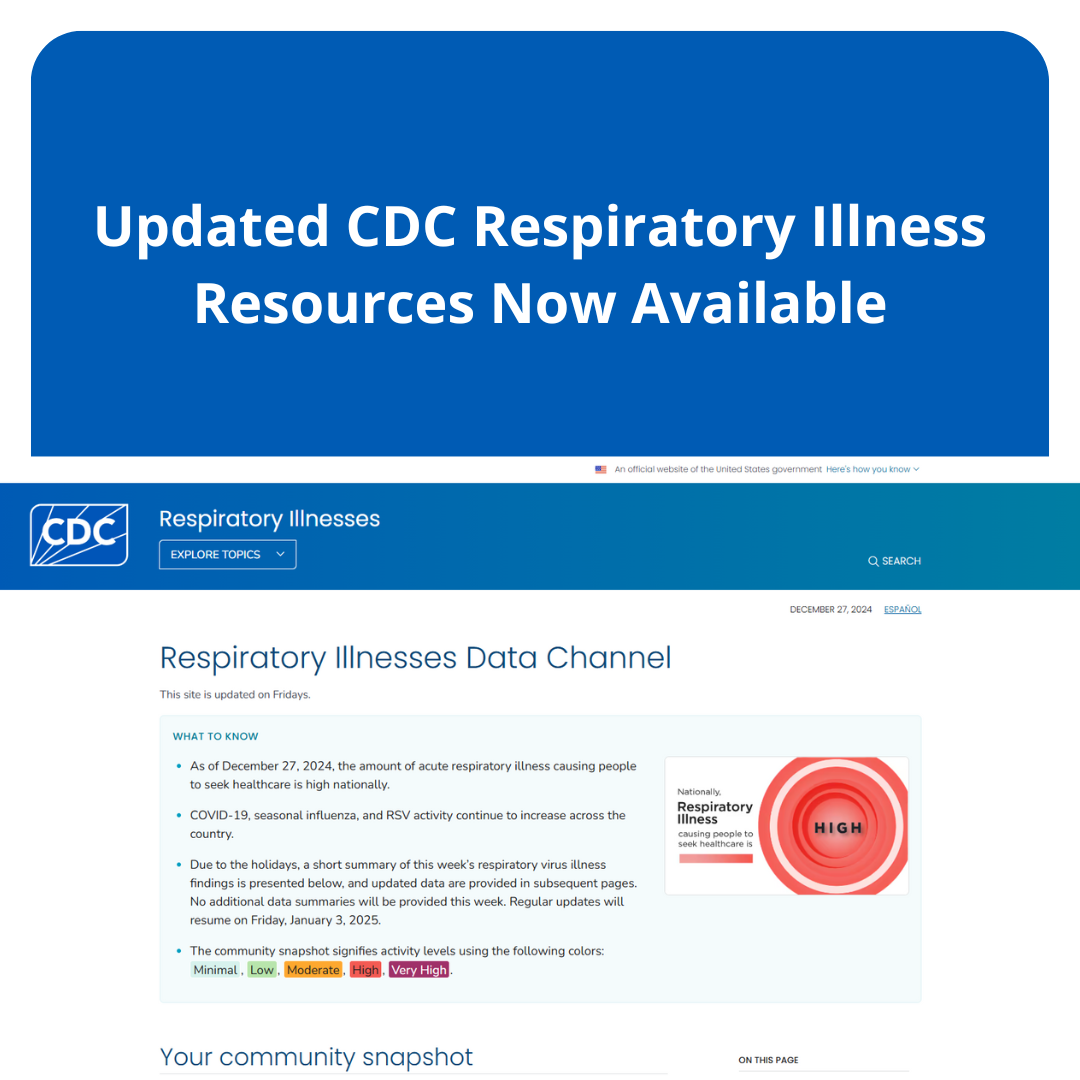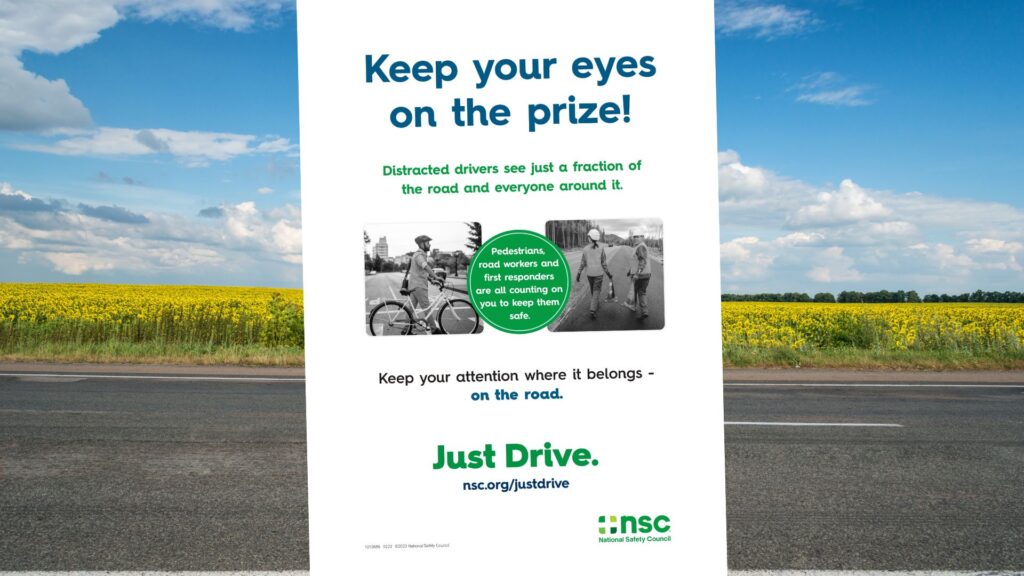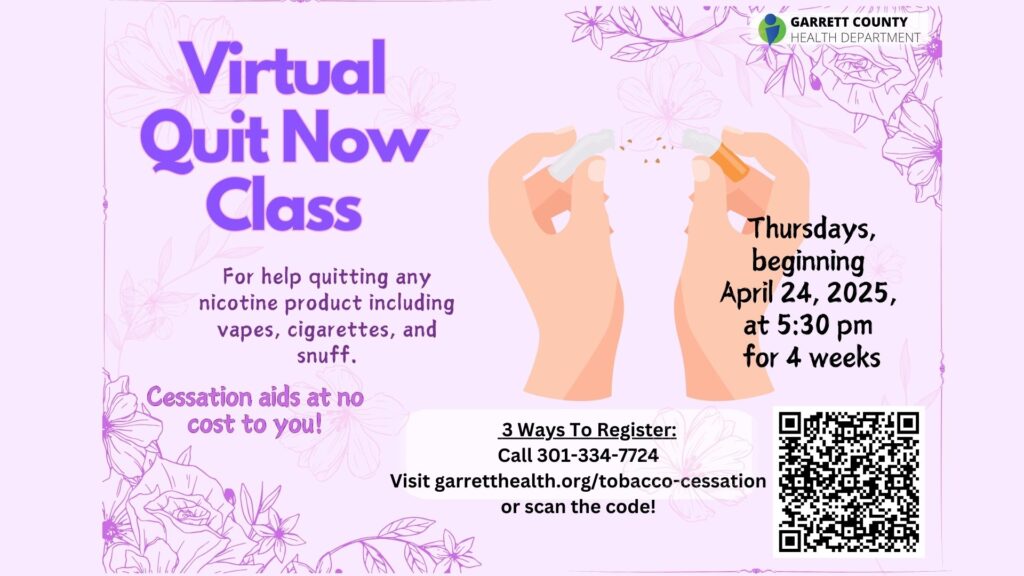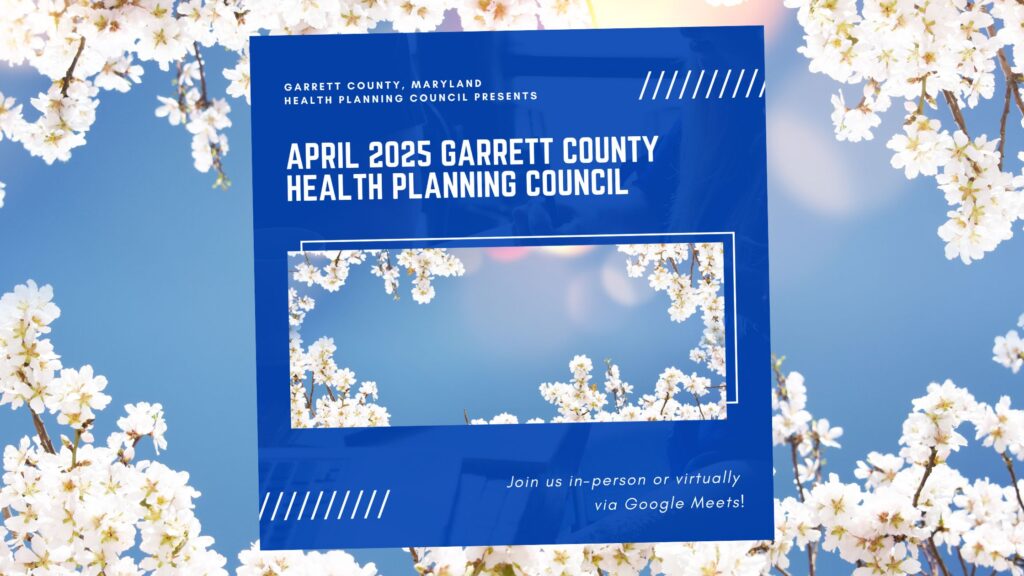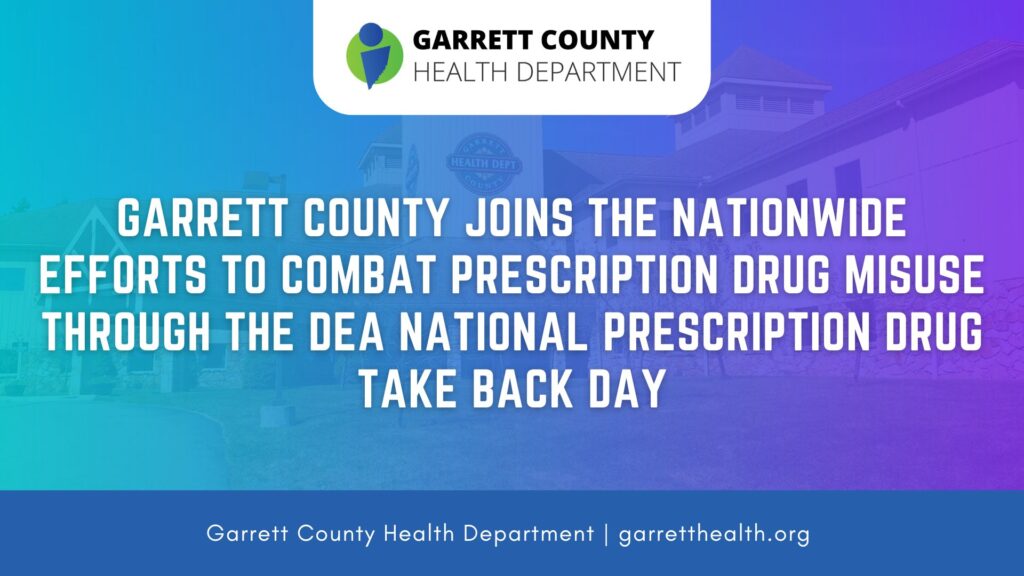There is a Moderate Heat Risk forecast for today (August 28, 2024) and a Minor Heat Risk forecast through Sunday (9/1). Please see the following tips from FEMA, the Maryland Department of Health, and the CDC, or visit https://ephtracking.cdc.gov/Applications/HeatRisk/ for more information and additional forecasting.
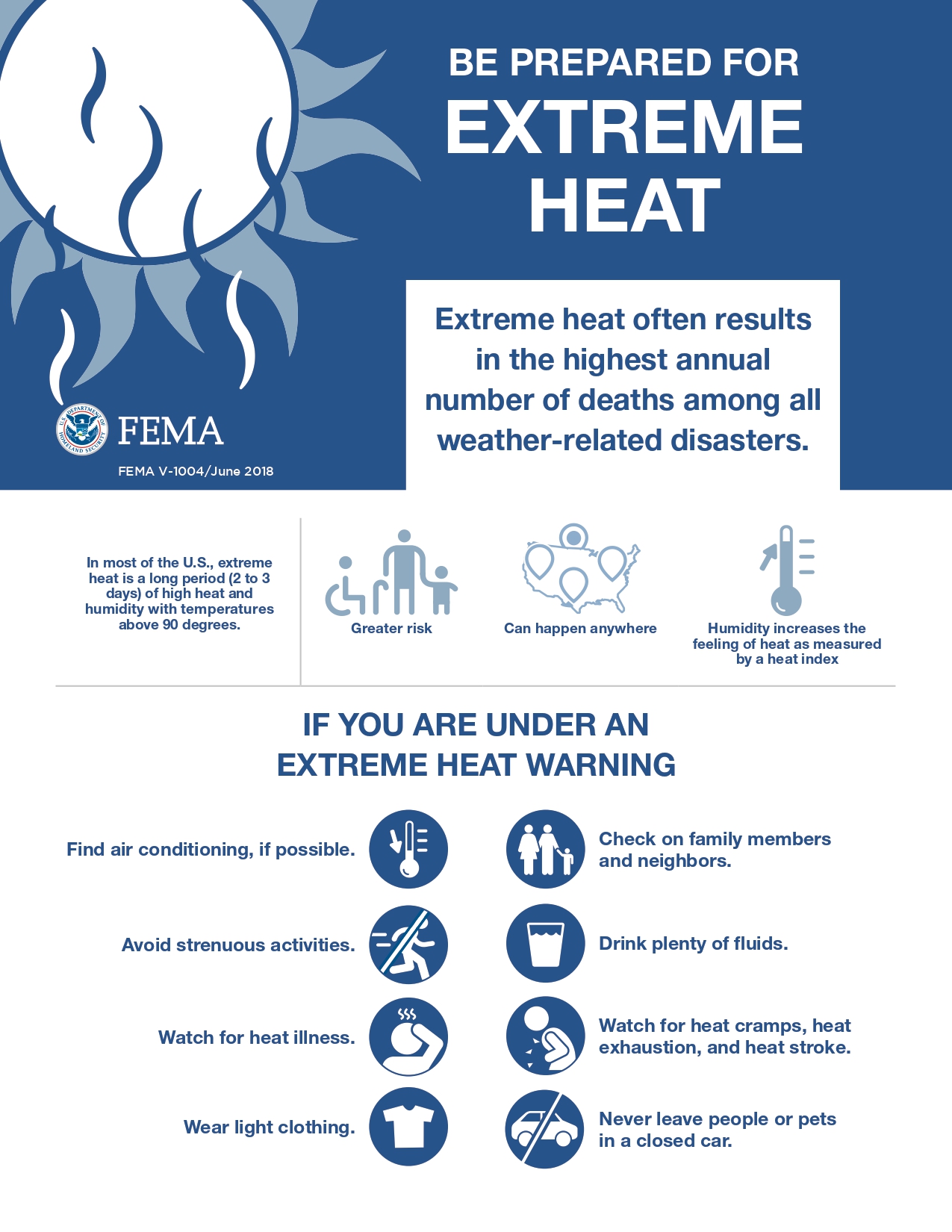
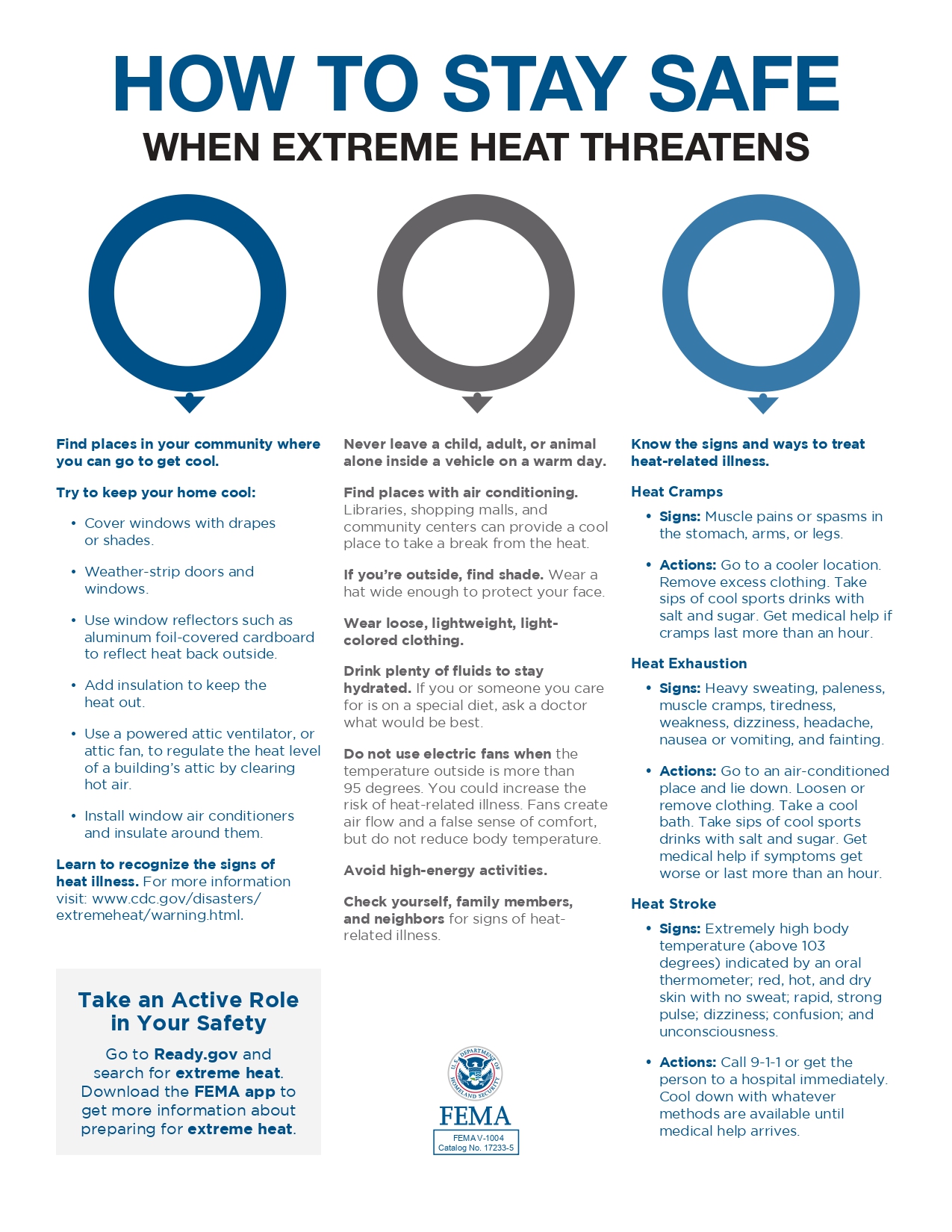
Preguntas? Llámenos al 301-334-7770 para servicios de traducción.
Accessibility assistance available at 301-334-7770.
Tips for Heat Safety (Maryland Department of Health):
https://health.maryland.gov/preparedness/Pages/resources_hot.aspx
What causes heat-related illness?
Heat-related illnesses: when your body can’t keep itself cool.
The body normally cools itself by sweating. As sweat evaporates from the skin, it lowers body temperature. But on hot, humid days, moisture in the air keeps sweat from evaporating fast enough. When this happens, body temperature can rise and make you feel sick.
What are the types of heat-related illness?
- Heat cramps: Short, severe cramps in the muscles of the leg, arm, or abdomen. This can happen during or after heavy exercise in extreme heat. Heavy sweating uses the body’s supply of salts, which causes cramps. Heat cramps also may be a symptom of heat exhaustion.
- Heat exhaustion: Occurs when a person spends time in a hot environment without drinking enough fluids. Symptoms include extreme thirst, fatigue, weakness, clammy skin, nausea or vomiting, and rapid breathing.
- Heat stroke: The most serious heat-related illness. Heat stroke occurs when body temperature rises to as much as 106°F or higher within 10 to 15 minutes. Heat stroke can cause death or permanent disability if emergency treatment is not provided. Symptoms of heat stroke include red, hot, and dry skin, no sweating, and rapid, weak pulse.
How are heat-related illnesses treated?
Heat cramps:
- Stop all activity and sit quietly in a cool place
- Drink water, a sports drink, or other drinks with no caffeine or alcohol
- Do not resume activity for a few hours after the cramps go away. Heat cramps can lead to heat exhaustion or heat stroke
- Get medical help if the cramps do not go away in one hour
Heat exhaustion:
- Drink water or other cool drinks with no alcohol or caffeine
- Rest
- Take a cool shower or bath
- Go to an air-conditioned environment
- Wear lightweight clothing
Heat stroke:
- Get the victim to a shady or cool area and call emergency medical assistance immediately. Until they arrive, do the following:
- Cool the victim as quickly as possible with a cool bath or shower, a spray of cool water from a garden hose, or by wrapping the victim in a cool, wet sheet
- Check body temperature often and continue cooling efforts until temperature drops to 101-102°F
Who is at risk for heat-related illnesses?
Anyone at any time can suffer from heat-related illness, but some people are at greater risk than others.
- Infants and young children
- Youth athletes
- People over age 65
- People with certain health conditions, such as mental illness, diabetes, and hypertension
IMPORTANT: If you take prescription medication, ask your doctor if you need to take extra care in hot weather.
What is the “heat index?”
The heat index tells you how it feels outside in the shade. It is not the same as the outside temperature.
The heat index is a measurement of how hot it feels when relative humidity is combined with the effects of the air temperature. The National Weather Service will issue a Heat Advisory for a heat index greater than 105°F.
How can I prevent heat-related illnesses?
- When the heat index is high, stay indoors as much as possible.
- Move to the lower floors of your building.
- Schedule outdoor activities for cooler times of the day, before 10 a.m. and after 6 p.m.
- Wear light-weight, light-colored, loose-fitting clothing.
- Drink plenty of water before starting any outdoor activity.
- During outdoor activities, take frequent breaks and drink water or other fluids every 15 to 20 minutes, even if you don’t feel thirsty. Avoid alcohol and caffeine.
- NEVER leave infants, pets, children, or the elderly inside a parked car.
- Dress infants and children in cool, loose-fitting clothing and shade their face with a hat or umbrella.
- Fans will not prevent a heat-related illness. Take a cool shower or bath or move to a room with air conditioning.
- Check on adults you know that are at-risk for heat-related illness at least twice a day.
- Constantly monitor children for signs of heat-related illnesses.
Hot weather tips
- Apply sunscreen of SPF15 or higher at least 30 minutes prior to heading out. Continue to apply as the package directs. The most effective products are those that say “Broad Spectrum” or “UVA/UVB Protection” on their labels.
- Wear sunglasses and a wide-brimmed hat to protect your eyes and face in the sun.
- Avoid drinking certain types of beverages:
- Reduce caffeine intake from beverages including coffee, tea, cola, and other heavily caffeinated beverages.
- Alcoholic beverages and drinks that are high in sugar.
- Very cold drinks, as they can cause stomach cramps.
- Avoid eating hot foods or heavy meals as they add heat to your body.
What can I do to prevent hyperthermia and heat stroke for my pets?
- Prior to a heat emergency, stock up on pet food, bottled water, medications, veterinary records, cat litter/pan, can opener, food dishes, first aid kit, and other supplies.
- Never leave a pet alone in a car, even with the windows cracked.
- Never leave a pet leashed at home unsupervised.
- Limit your pet’s exercise to the morning or evening when temperature and heat index is not as high. Bring water while exercising pet.
- Limit the distance and intensity of your pet’s exercise.
- Ensure that fresh, cool water is available at all times for your pet.
- Ensure that air conditioning is available for your pet if left indoors.
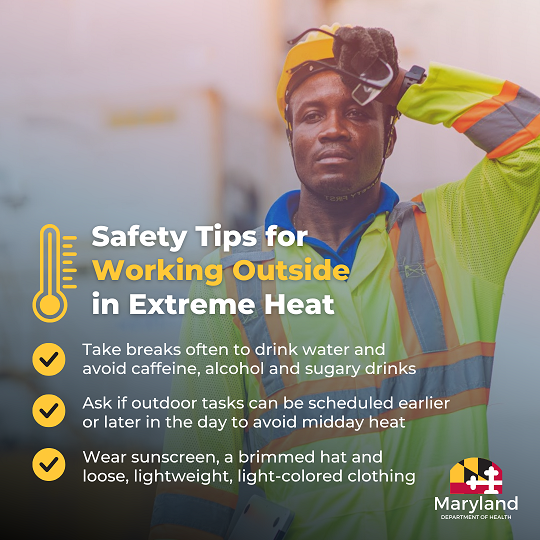
Actions you can take to protect your health (CDC):
Stay hydrated.
Stay cool.
If possible, consider moving outdoor activities to a cooler day.
If you have to be outside, you can:
- Stay in the shade as much as possible.
- Take breaks when you can.
- Do outdoor activities during the coolest parts of the day or evening, if possible.
When you are indoors, you can:
- Use air conditioning or find a location that has one.
- Use a fan to cool your body off, only when indoor temperatures are less than 90°F.
Check on your family, friends, and neighbors, especially if they have chronic medical problems or live alone. Check on pets.
Check the air quality in your area before heading out.
Work with your doctor to see if you need to take additional health actions.
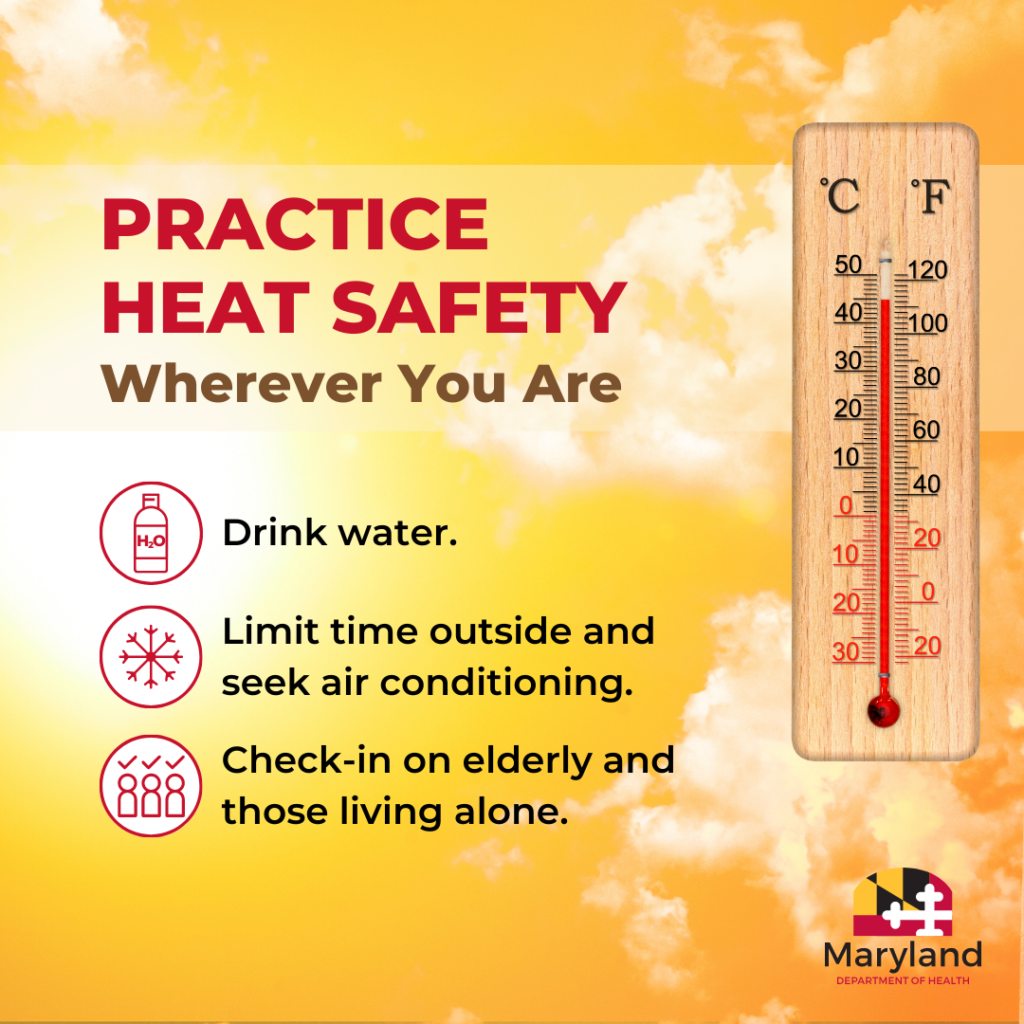
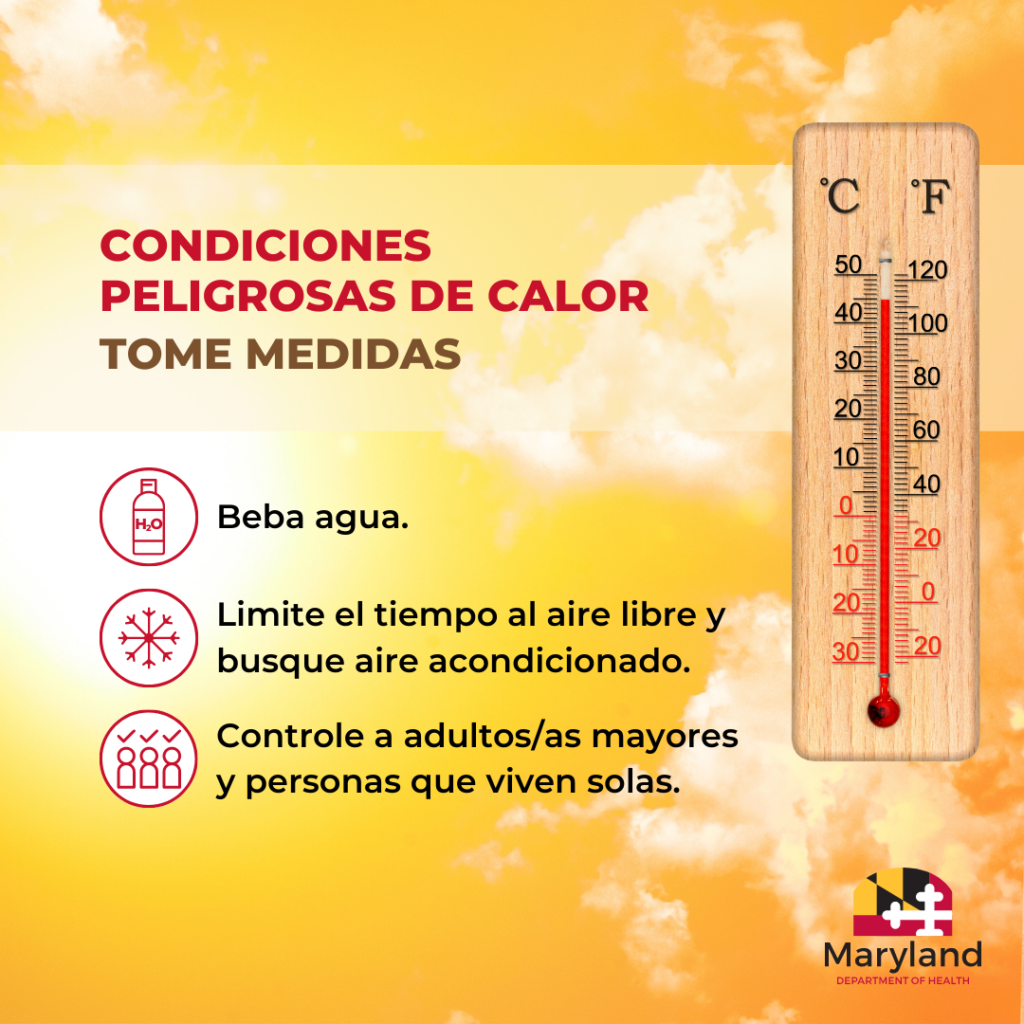
- Don’t Miss These Fantastic Opportunities! – Explore Great Behavioral Health Jobs In Garrett County! - April 22, 2025
- April is Distracted Driving Awareness Month #3 - April 22, 2025
- Virtual Quit Now Classes Start This Week (4/24)! - April 22, 2025




